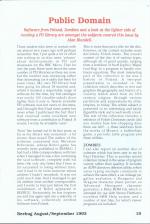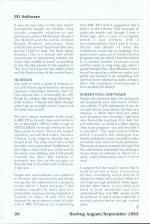Software from Poland, Zombies and a look at the lighter side of running a PD library are amongst the subjects covered this issue by Alan Blundell.
Public Domain
Those readers who were in contact with me almost two years ago will perhaps remember that I put quite a lot of effort into writing an on-disc news 'column' about developments in PD and shareware for the BBC Micro. That far into the past, there were about the same number of PD libraries as there are now, but the number was increasing rather than decreasing (as it sadly has been for some time). My own PD library had been going for about 18 months and, whilst it boasted a respectable range of software for the time, my full catalogue was easily 100 (double-sided) discs lighter than it now is. Newly available PD software was hot news to devotees, and I thought that I had some pretty hot news when I publicised the fact that I had received some excellent new software from a contributor in Poland. It would, I wrote, be available 'soon'.
'Soon' has turned out to be two years, as far as my library was concerned - a bit slower than usual! The author of the software concerned was Miroslaw Bobrowski, whose Robol game has recently been published in Beebug. I had had a little correspondence with him when I managed to lose a disc containing the said software, complete with his letter (the only disc/letter that I have so far succeeded in losing without trace, and it had to be from someone whose address I hadn't recorded). It was not until much later that I managed to get his address from another correspondent, and I wrote to him just before the first instalment of Robol appeared in Beebug.
Fortunately, he has forgiven me and has again sent me a selection of his software, collectively entitled Software From Poland.
This is more than just a title for the disc, however, as the content includes some definitely Polish items. The overall content of the disc is of various types, although all of good quality, ranging from a rendition of Scott Joplin's 'Maple Leaf Rag' to a program to handle non-linear equations. The most interesting part of the collection to me was a history of Poland. A two-part presentation, is included in the collection which describes in text and graphics the geography and history of a country which went from its 10th century origins, through various partitions and annexations by other empires, to today.
The whole subject is presented in an interesting and easily digestible style and is well worth a look. The rest of the collection includes a selection of Polish Christmas carols (did you realise how few shopping days there are left?....), three selections from the works of Mozart, a battleships game, a periodic table program and three utilities.
Zombies
I can also report on another disc of software which has been sent to me by Paul Fletcher. This is another mixed collection (mixed in the sense of program variety rather than quality). It includes an ADFS directory deletion utility, which saves typing multiple commands to achieve the same effect, a car mileage per gallon evaluator, a Dungeons and Dragons character sheet printer, an Advanced HeroQuest character generator, a Help ROM file which is intended for use with Steven Flintham's excellent SWR Help system, and a number of text files, for which viewer programs are included.
It was the text files on this disc which particularly caught my interest. They include complete solutions to two adventure games; Melbourne House's The Hobbit and the public domain Bungle Brothers adventure. Also included are several humorous files and, the one I had to read, The Truth About Zombies. This is a factual text which concentrates on discovering whether the horror film zombie is based on anything in real life (the answer to the question is 'Yes', but I won't go into the details of the real-life Haitian basis of the zombie here).
Humour
You have to have a sense of humour to run a PD library (apart from the obviously necessary masochistic tendency, that is!). Like anyone else, I occasionally do silly things by mistake (like losing Miroslaw's letter & disc). I always feel better though when I get an example of how it can work the other way as well.
The one I always remember is the writer to BBC PD in its early days, who wrote to me in December 1990 to order a copy of Spellcheck (it would obviously have been useful to him!). This is my longest standing unfulfilled order, because whoever it was forgot to identify him or herself at all. The only clue I have is that the letter was postmarked 'Sutherland'; if this rings a chord with you, write and let me know your address and I will gladly forward the disc! The method of payment was also rather unique, so describe that in the letter and I will know it was you.
People who send software in for addition to libraries also occasionally get things wrong, like the submission of a program to me which I knew because I had written it myself. In itself, this isn't particularly unusual, having happened a number of times. It also isn't that unusual for me to receive a copy of a disc with a BBC PD menu (i.e. originating from BBC PD) with a suggestion that I add it to the library. One example in particular stands out, though: I was, a while ago, sent a copy of a program which I had written, with a recommendation that I add it to my library and details of what the contributor would like in exchange. Not particularly unusual in itself, but this program was one which I had distributed to a limited number of people using another name (a long time ago, when I partly thought that 'Alan Blundell' didn't sound too good as a software author and partly just wanted to try something out) and had never released as public domain. More, the contributor had acquired it from another PD library!
Submitting Software
People who send me their own programs are frequently very dismissive of their own efforts ('I will understand if you do not add this to your library, but here it is anyway.. '). More often than not, when such programs are circulated, I get back very favourable reactions. It is rarer, but not unknown, to receive a letter saying 'here is my program - you will find that it is excellent'. The most recent of these which I actually did catalogue was hastily withdrawn from circulation when everyone who tried it found problems.
The most excessive example thought that his contribution warranted my sending a dozen discs of software in return for a quite small submission which I never used.
I suppose that the moral I would like to draw from this is that, if you have written something which may be of interest to others, but you don't think it is of a high enough standard, think again.
On the other hand, if you think your work is truly wonderful and can't understand how any BBC owner could do without it, ask a close friend for a second opinion before you get carried away.
This article was converted to a web page from the following pages of Beebug Volume 12 Number 4.


 1st August 1993
1st August 1993

